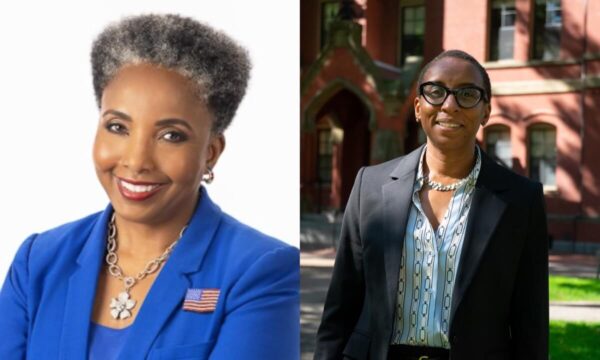Despite Harvard’s Support, President Faces Fierce Criticism from Conservative Mouthpiece Over Plagiarism Claims: ‘An Insult to Intelligence’
Harvard University President Claudine Gay faced growing calls to resign this week despite the college showing unequivocal support to its first Black leader following a disastrous congressional hearing that accused the lifelong educator of allowing anti-Semitism to run rampant on the Ivy League campus during recent protests.
Gay faced the most explosive criticism from a former Vanderbilt University professor, Carol Swain, whose academic work she is accused of plagiarizing.
Swain is one of four scholars Gay allegedly copied but did not cite in her doctoral thesis at Harvard 26 years ago.
In light of the school’s choice to keep Gay, Swain said Harvard had shown preferential treatment after Gay had benefitted from the school’s diversity initiatives, adding that Harvard stood with the 53-year-old academician only because she is the university’s “first Black president.”
“It is an insult to intelligence what Harvard University has done,” Swain told Fox News Digital in comments about Harvard Corporation’s decision to let Gay off the hook for plagiarism, adding: “I feel like her whole research agenda, her whole career, was based on my work.”
Gay continued to face growing backlash more than a week after her devastating testimony on Capitol Hill on Dec. 5, alongside Massachusetts Institute of Technology President Sally Kornbluth and University of Pennsylvania President Liz Magill.
In recent days, at least four “doxxing” trucks with various digital billboards slamming Gay have also been spotted circling the campus and the embattled president’s home outside Boston.
Another sign reads: “Claudine Gay: the best friend Hamas ever had,” while others were seen that said, “Fire Gay” and “Gay refuses to protect Jewish students.”
The controversy surrounding Gay’s dissertation arose in recent days after an investigation by the conservative policy magazine City Journal alleged Gay violated several Harvard policies on academic integrity after she copied whole passages from other academic works without proper attribution.
Swain is a 69-year-old author, as well as a prominent legal scholar and conservative advocate who frequently appears as an expert voice on the TV news circuit.
The former Democrat, who also is Black, voted for Donald Trump in 2016, and her support earned her a high-profile position as vice chair of Trump’s “1776 Commission” that served as a Republican alternative to the award-winning New York Times Magazine’s 1619 Project. That 2019 series began reexamining pre-Civil War history while highlighting systemic injustices that continued to impact the Black community 400 years after enslaved people were first brought to American shores from Africa.
As a respected public voice, Swain weighed in on the controversy surrounding Gay during the online news show earlier this week after Harvard’s governing board announced that a probe into Gay’s suspected plagiarism turned up only “a few instances of inadequate citation,” which required corrections but amounted to no real violations of Harvard’s standards for academic conduct.
“My blood pressure is rising today because of Harvard’s decision that what she did doesn’t constitute plagiarism, and it doesn’t rise to the level of her removal,” Swain fumed on the show. “My message to Harvard is: You don’t get to redefine what is plagiarism. Most of us know what plagiarism is.”
The decision allowed Gay to go back into her original works and insert citations and quotation marks that had been omitted. But more importantly, it reaffirmed her presidency amid growing calls to resign after reports students had called for the killing of Jews while Gay and other college administrators never enforced the student codes of conduct to tamp down the rhetoric.
But Swain highlighted the accusations of plagiarism as her primary concern with Gay and blasted the university for not taking the appropriate action in the matter.
“Obviously, the Harvard Corporation did not have the courage to fire its first black president, someone who should never have been elevated in the first place,” she said. “They have decided they would rather lower standards for everyone rather than to hold her — who attended the most, you know, elite schools in America — to the same standards that average Americans are held to.”
Throughout the interview, Swain emphasized her disgust with Gay being allowed to keep her job, especially in light of the academic misconduct claims, which arose this past week as Gay and other university presidents testified before lawmakers who accused the educators of sitting by as some students threatened violence amid the Israel-Hamas war.
Swain called Gay’s actions as a doctoral student “very demeaning to every person, not just racial and ethnic minorities, but anyone who has worked in school, who’s written papers, who’s tried to follow the guidelines,” she said.
“A white male would probably already be gone,” Swain added, highlighting the divisiveness of the moment.
Meanwhile, the uproar continues over Gay’s congressional testimony in which she and fellow educators faced fierce criticism for not providing direct answers when lawmakers asked whether they condemned speech that called for the destruction of Israel and the genocide of Jews.
Instead of denouncing anti-Semitism outright, the educators provided cautious responses that infuriated lawmakers.
Magill has since resigned, while Gay and Kornbluth continue to face widespread calls for their removal.
Previously, Rep. Elise Stefanik, the New York Republican who led the contentious hearing, sent a letter to the governing boards of Harvard, Massachusetts Institute of Technology and the University of Pennsylvania to demand the immediate resignation of the administrators and called for an action plan to ensure the protection of Jewish students, faculty and community members.
This week, Stefanik also introduced a resolution to condemn last week’s congressional testimony by the college administrators, saying: “This is not a partisan issue but a question of moral clarity, which is why our colleagues from across the aisle have come together with us to introduce a resolution condemning anti-Semitism on university campuses as well as the morally bankrupt testimonies.”

